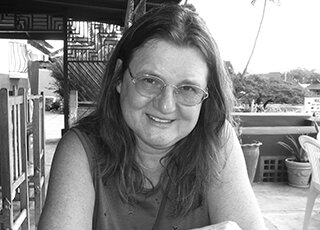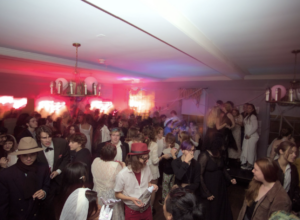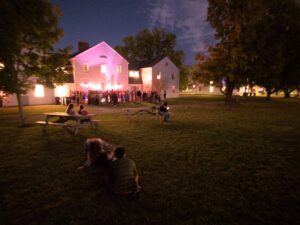
A few weeks ago I sat with Miroslava Prazak, known to students and faculty as Mirka, to discuss Bennington, Anthropology, and the benefits of a progressive education. Mirka has taught Anthropology at Bennington college for nearly 30 years and is retiring after next spring.
Last Semester I was able to take Mirka’s class in Medical Anthropology. Mirka let us lead discussions after providing us with material, subtly directing the conversation but letting the small class go where we were interested. What stood out to me was an understanding of nuance and cultural difference without a dispassionate method of Anthropology that observes without making any statements.
Mirka led me into her spacious office in the Barn looking out onto campus and lined with books on all four walls. She sat down with a diet coke in her hand and took off her sunglasses as I sat across from her. After catching up briefly about the semester, we began our interview.
What led you to Bennington?
Bennington was actually my first job. I had a postdoc in Australia. After I got my PhD, I moved to Australia and I spent three years there. My husband and I had two kids at that point. We didn’t want to raise our kids in Australia. So we came back to the States in February and I started applying for jobs. I was invited for an interview to Bennington and so I came here in March and was offered the job. I didn’t take it initially because this was going to be really different. Both my husband and I are big city people. He’s from Seattle, I’m from Prague and we’re moving from Canberra, which is the capital of Australia. And other than doing field work, we have never lived in a rural area. My daughter was three and my son was about six weeks.
That’s a long plane ride with a six-week old.
Well, he was not a problem. It’s harder with a three-year-old. He just had his little bassinet but she was pretty mobile at that point in time. It’s a long time to sit for a three-year-old.
I brought the whole family up here to see how they would like it here. And it was beautiful. We decided we’ll give it a try. We also knew that Bennington doesn’t have tenure and it doesn’t have all those things. We thought it would be a three-year commitment, right? We thought; well, we can certainly do anything for three years, right?
You liked it so much you decided to stay?
I really liked Bennington college. That was what really attracted me because I just liked all those things that were different from other schools. I went to very straight schools. I got my B.A. at Smith and my Ph.D. at Yale. So these are very American, basic educational institutions. I really liked the exploratory spirit of Bennington and that it didn’t have departments and that it didn’t have grades.All of those things were really very attractive to me. I had a couple of really long conversations with Liz Coleman who was then president and she convinced me that just because there’s no tenure here doesn’t mean that I couldn’t be here forever. After I had been here 15 years, I thought, well, she was really right.
Do you think you will stay here after you retire?
We have a house in North Bennington and that’s kind of an anchor. We’ll probably be here much of the time. Hopefully we will be able to spend some time in the Czech Republic. Yeah. The sabbatical I had last year was great. I had not lived in the Czech Republic in 50 years and it felt absolutely like home. We’ll play it by ear. I have no major plans for retirement other than to take a year to relax. I’ve been working such a long time that it seems like that’s the thing that I have not done. Relax. I’ve made some small decisions, I know that I’m going to send my books to Africa through an organization that sends school books there..
I have a book underway that I’m going to finish. And part of what I’m doing this summer is to go to the archives in Liverpool and look through their collection of writings by their missionaries. It’s a Catholic collection. A Missionary society who were in rural Kenya in the 1890s. I’m looking for information about what it was like then in the area I research, because the book I’m writing is about a woman who was born about 1912.
Are you writing a history of her?
At the core it’s about the changing role of women in the world and in society over the 20th century in rural Kenya, but it is about her. She’s the backbone of the book and it is her life history.
And you went to rural Kenya?
Many times. That’s where I have been doing my research since the 1980s.
What’s her name?
Her name is Serina Mubusi. She was one of the people I talked to most extensively. She was very keen to let me know what it was like here and in what ways her life was similar or different from my parents or my grandparents. I call her Gooko which means grandmother and she’s about that age to have been my grandmother. It was a relationship that allows for great freedom because when you’re of the adjoining generations then you have to treat each other with respect but if you’re alternating then you can have a joking relationship. You can talk about anything, including sex. She passed away in 2010, but we started talking in 1987. It was a long time ago. We had a long standing relationship.
So did you set out at the beginning of your career wanting to study Kenya specifically?
When I got ready to do field work, my parents were living in Africa, so I had visited other countries and I knew I wanted to do my research in Africa. I wasn’t necessarily set on Kenya. It was, I don’t know,fate or something. I had a classmate at Yale who was from Kenya. He was Kuria. My parents were living in Uganda at the time. I went and visited Uganda thinking maybe this would be a good place to do my research and it was really very, very difficult due to the ongoing civil war. When I got back to New Haven I was talking with my classmate and I said, “I just don’t know what I’m gonna do, but I know one thing for sure and that is I cannot spend every morning just going from one funeral to the next, because there was so much killing all around.” He said, “Well, then you should go study my people.” I had enough conflict. That’s not my area. I’m more interested in studying peace than I am in studying war.
This is going back a long time, but what drew you to anthropology? Do you think growing up, in the Czech Republic and then coming to the U.S., having two cultures informed that?
Absolutely. But I was a child in the Czech Republic. When I was about ten, my dad started working for the U.N and so we moved to Pakistan. I lived there for eight years. During that time Russians invaded the Czech Republic, my family were granted political asylum to come to the U.S. and I attended college in this country.
So you had enough conflict.
Yeah. It obviously affected me personally. It changed the course of my life. I was an undergraduate major in anthropology, so I think that the way that I grew up had a lot to do with the direction my studies took.. I found it really interesting how different people do the same thing differently. I mean, we all have basic needs and whatnot, but we all go about meeting those in such different ways.
At Bennington, what’s been your favorite class to teach?
There are some things that I teach, that I have taught repeatedly, like the course that I’m teaching this term, it’s called Other People’s Worlds. The course basically begins with looking at Europe in the 15th century, and asking the question, well, what happened to make Europe become the superpower that conquered the whole world? I mean, that started in the 15th century and it has continued until today. I have taught that a number of times and taken it in different directions, but that’s the basic idea. This term we have focused on societies in the Americas. Looking at how people and societies were affected during contact and shaped by that contact experience and the issues that arise from that today.
For many years I taught ethnographic film and I’ve really enjoyed that. I really like environmental anthropology. I’ve had students who have gone on to get PhDs having taken that as an intro class to environmental studies. The great thing about Bennington is that I can teach whatever I want.
What do you hope students take away from anthropology?
I think first and foremost, an appreciation of other people’s ways and a respect for people who do things differently. Bennington students of all people on earth should be the ones to recognize that it is really valid to listen to a different drummer, if you will, and to follow that different drummer. Those are the basic things [I want them to take away], that they appreciate diversity, they respect the ideas and ways of people who come from different walks of life. Ethnocentrism is a dangerous thing, even though every culture is ethnocentric. We have to be really careful about judging others by our criteria, not those they had learned. I think that it’s really important to try to understand why people do what they do and that’s where history comes in too.
When I was in Europe for my sabbatical, I was thinking “Well what class can I teach that I really would like to teach that I have not done?” I thought I should teach a class about the Abenaki. The thing is I don’t know much about Abenaki people and culture and when I proposed the course it was knowing that I would have to learn everything. My idea behind it was that we’re surrounded by people whose life ways are different and we don’t know anything about them. We can change that.
I noticed for fall, you’re teaching a field work class about Bennington that seems similar to starting anthropology where you are.
Absolutely. This was actually a class that we developed almost a decade ago, through an NSF grant. It was meant to be an environmental course, and as anthropologists,we define the environment as including people. You can look at Bennington from many different perspectives, and we do in the course, but the people are almost always an important part of that. This Fall the section on the Abenaki is going to be much stronger than it has ever been.
It seems very interesting, because also, we come here and we don’t know much about Bennington as a place.
It’s not just any place, but it is a place that was settled by some of the most outrageously fundamentalist Christians. This Congregational splinter from the Puritan church thought that the Puritans were too progressive, So if you go to Old Bennington, you see the First church. It was one of the first structures of the settlers, who came to Bennington, chartered in 1749.
You have been at Bennington almost 30 years now. How has it changed over the time you have been here?
Bennington College has changed a lot since I came here but American society has changed a lot too. The COVID years were really tough, and I was not happy with teaching online. I found that really difficult and counter to the Dewey principles on which the college was founded . I value progressive education because it is based on experiential learning, which focuses on the strengths and interests of each student, allowing each student to learn about what interests them and how to develop that interest into talents or skills they can use throughout life. Progressive education is open to different ways of knowing. This kind of progressive education doesn’t really work online. I would like Bennington to continue in its old focus. I hope that Bennington prospers. I think that, to me, that would be the best thing coming out as I retire, that this college continues in that vein to offer a real alternative to what other schools do. I think in this way of really preparing and encouraging people to be creative to make change in the world, there’s no school better than Bennington.
Do you think Bennington has started to move away from that progressive education in a way?
Yes and I think a lot of it has to do with the perceived high cost of education. An investment in progressive education prepares an individual to lead a fuller life and contribute that knowledge and experience to the betterment of society. I think that over the last decade or so, the college has been moving towards being more similar to other schools. Because I like it being different, that has always seemed not a good direction to go in. But I’m not an administrator or a fundraiser.
I think that as long as the students insist they can be a strong voice in keeping the important things about this progressive education going into the future. I have always believed that the two most important constituent bodies in the college are the students and the teachers. That is what education is about and everything else makes it possible.
You are one of two Anthropology professors at Bennington College. Once you leave, what will the school do?
I firmly believe that another anthropologist will be hired. Somebody will come and take this job. I haven’t heard of a search or anything yet, but I think that will happen, probably next year.





Be First to Comment